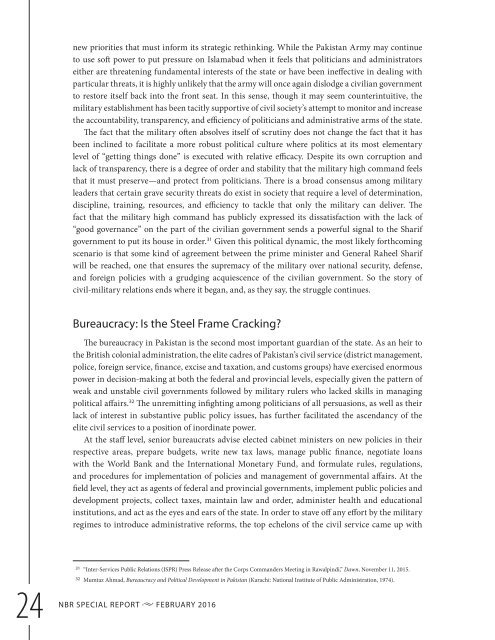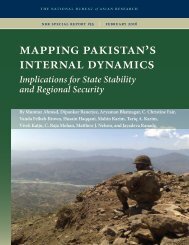pakistan’s
SR55_Mapping_Pakistan_February2016
SR55_Mapping_Pakistan_February2016
Create successful ePaper yourself
Turn your PDF publications into a flip-book with our unique Google optimized e-Paper software.
new priorities that must inform its strategic rethinking. While the Pakistan Army may continue<br />
to use sot power to put pressure on Islamabad when it feels that politicians and administrators<br />
either are threatening fundamental interests of the state or have been ineffective in dealing with<br />
particular threats, it is highly unlikely that the army will once again dislodge a civilian government<br />
to restore itself back into the front seat. In this sense, though it may seem counterintuitive, the<br />
military establishment has been tacitly supportive of civil society’s attempt to monitor and increase<br />
the accountability, transparency, and efficiency of politicians and administrative arms of the state.<br />
The fact that the military oten absolves itself of scrutiny does not change the fact that it has<br />
been inclined to facilitate a more robust political culture where politics at its most elementary<br />
level of “getting things done” is executed with relative efficacy. Despite its own corruption and<br />
lack of transparency, there is a degree of order and stability that the military high command feels<br />
that it must preserve—and protect from politicians. There is a broad consensus among military<br />
leaders that certain grave security threats do exist in society that require a level of determination,<br />
discipline, training, resources, and efficiency to tackle that only the military can deliver. The<br />
fact that the military high command has publicly expressed its dissatisfaction with the lack of<br />
“good governance” on the part of the civilian government sends a powerful signal to the Sharif<br />
government to put its house in order. 31 Given this political dynamic, the most likely forthcoming<br />
scenario is that some kind of agreement between the prime minister and General Raheel Sharif<br />
will be reached, one that ensures the supremacy of the military over national security, defense,<br />
and foreign policies with a grudging acquiescence of the civilian government. So the story of<br />
civil-military relations ends where it began, and, as they say, the struggle continues.<br />
Bureaucracy: Is the Steel Frame Cracking?<br />
The bureaucracy in Pakistan is the second most important guardian of the state. As an heir to<br />
the British colonial administration, the elite cadres of Pakistan’s civil service (district management,<br />
police, foreign service, finance, excise and taxation, and customs groups) have exercised enormous<br />
power in decision-making at both the federal and provincial levels, especially given the pattern of<br />
weak and unstable civil governments followed by military rulers who lacked skills in managing<br />
political affairs. 32 The unremitting infighting among politicians of all persuasions, as well as their<br />
lack of interest in substantive public policy issues, has further facilitated the ascendancy of the<br />
elite civil services to a position of inordinate power.<br />
At the staff level, senior bureaucrats advise elected cabinet ministers on new policies in their<br />
respective areas, prepare budgets, write new tax laws, manage public finance, negotiate loans<br />
with the World Bank and the International Monetary Fund, and formulate rules, regulations,<br />
and procedures for implementation of policies and management of governmental affairs. At the<br />
field level, they act as agents of federal and provincial governments, implement public policies and<br />
development projects, collect taxes, maintain law and order, administer health and educational<br />
institutions, and act as the eyes and ears of the state. In order to stave off any effort by the military<br />
regimes to introduce administrative reforms, the top echelons of the civil service came up with<br />
31 “Inter-Services Public Relations (ISPR) Press Release ater the Corps Commanders Meeting in Rawalpindi,” Dawn, November 11, 2015.<br />
24<br />
NBR<br />
32 Mumtaz Ahmad, Bureaucracy and Political Development in Pakistan (Karachi: National Institute of Public Administration, 1974).<br />
SPECIAL REPORT u FEBRUARY 2016



